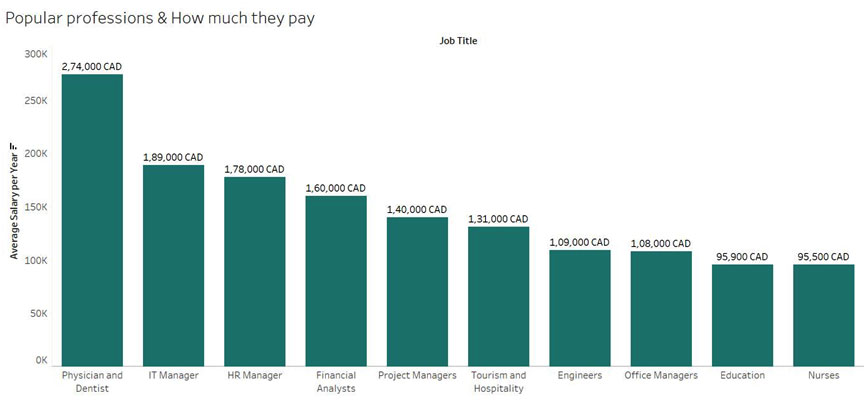Job opportunities in Canada after graduating from Canadian colleges
An important aspect in deciding a study abroad destination is the work opportunities available after the course is completed. The cost of higher education coupled with the cost of living in a foreign country is quite expensive and hence, the job prospects after graduation become a crucial factor in choosing whether to pursue a course abroad. The availability of jobs is also an important factor in determining the particular specialization that a candidate may opt for.
The country’s policy towards offering work opportunities to its international students is often one of the most important reasons for a student to choose it to pursue higher education. Conducive work policies benefit the student as it is not financially viable to return to your home country after earning an expensive educational qualification.
In such a scenario, it is no secret that Canada is one of the topmost preferred destinations for international students looking to pursue their higher studies abroad and is amongst the top study abroad destinations that offers the best job and stay back opportunities post study.
Canada, the 10th largest economy in the world, boasts of an unemployment rate of less than 6% with an employed population of 20.56 million people. Graduates from institutes in Canada are high in demand which is why there are abundant job opportunities for Indian and international students. You can work in Canada after you graduate and you will need a work permit to do so. Further, you may also qualify for permanent residence in Canada. The post-graduation work permit (PGWP) makes you eligible to temporarily live and work in Canada after graduating from a Designated Learning Institution (DLI).
Post Graduate Work Permit Program (PGWPP)
- The Post Graduate Work Permit Program (PGWPP) allows international students who have completed an educational degree from a participating Canadian post-secondary institution to be able to work after study in Canada. International students who gain skilled Canadian work experience may also qualify to apply for Permanent Residence (PR) through Canadian experience class.
- The PGWPP is beneficial to candidates who want more time to look for suitable employment and is also the first step to take for candidates who want to ultimately acquire a Canadian citizenship. This is because, if a candidate is sufficiently skilled and has the requisite work experience, he or she can become a citizen of Canada under the Express Entry scheme.
- The PGWPP allows the candidate to work for a period equal to the duration of the program of study the candidate has pursued in Canada. The maximum duration of work permit under the PGWPP is three years. This means that the work permit is not offered for a period longer than the length program of study completed by a candidate. The minimum duration of work after study in Canada offered under the PGWPP is eight months. Candidates who are pursuing courses in Canada which are less than 8 months in duration are not eligible. Also, whether a candidate is pursuing a three-year course or a four-year course, the work permit offered under the PGWPP will be three years only.
PGWPP Eligibility Criteria Requirements
- Applicants can receive only 1 post-graduation work permit in their lifetime.
- You have up to 180 days after you graduate to apply for a PGWP.
They must have graduated from an eligible designated learning institution (DLI). They must also submit clear evidence that they meet all of the following criteria:
They have completed an academic, vocational or professional training program at an eligible institution in Canada that is at least 8 months in duration leading to a degree, diploma or certificate.
They have maintained full-time student status in Canada during each academic session of the program or programs of study they have completed and submitted as part of their post-graduation work permit application. Exceptions can be made only for the following:
- leave from studies
- final academic session
- They have received a transcript and an official letter from the eligible DLI confirming that they have met the requirements to complete their program of study.
Note: The transcript and official letter must be included in a post-graduation work permit application.
Within 180 days of the date of applying for the post-graduation work permit, applicants must also meet one of the following criteria:
- They hold a valid study permit.
- They held a study permit.
- They were authorized to study in Canada without the requirement to obtain a study permit under paragraphs 188(1)(a) and (b) of the Immigration and Refugee Protection Regulations.
Now that we have understood how you can take jobs in Canada, let us learn about top in-demand courses in Canada, degree requirements, average salary, top employers and more—
While Canadian universities and educational institutions offer a number of programs across several fields, some of them are considered the best from the point of view of bagging jobs. Here is a look at these courses:
- Engineering
- Business, Accounting and Finance
- Computer Science & Information Technology
Engineering
Canada is a growing hub for engineers and one of the best places to pursue a career in Engineering. Featuring top institutions and supported by state-of-the-art facilities, Canada produces a large number of engineering graduates every year who are equally demanded by employers owing to the excellent quality of education.
| Degree Requirements | B.E. / M.E. |
| Average Salary per year | C$ 101,000 |
| Job Titles | Civil Engineer, Design Engineer, Electrical Engineer, Mechanical Engineer, Robotics Engineer |
Business, Accounting and Finance
Canada serves as a center of academic excellence with some of the best institutions for pursuing programs in Business, Accounting and Finance that can help you find lucrative job offers.
| Degree Requirements | MBA, MSc Accounting, BBA, MSc Business Analytics, MSc Finance, MA Economics etc. |
| Average Salary per year | C$ 123,000 |
| Job Titles | Account Executive, Accounting Manager, Business Analyst, Cost Accounting Manager, Finance Executive |
Computer Science & Information Technology
Jobs in Computer & IT are among the top careers in Canada both in terms of salary and employment opportunities. Infact, IT project managers are among the top paid professionals in Canada. Besides, Canada is also home to big names in the world of computer science and information technology that further boosts your chances of getting a well-paid job.
| Degree Requirements | BSc Computer Science, MSc Information Systems, MSc Cyber Security, MSc Software Engineering, MSc Computer Science etc. |
| Average Salary per year | C$ 120,000 |
| Job Titles | Application Consultant, Business Systems Analyst, Game Developer, Information Security Manager, Network Administrator, Web Developer |
Popular professions in Canada & How much they pay
The average salary of professionals in Canada is 120,000 CAD per year. The salary for beginners is around 30,200 CAD per year which can soar up to 324,000 CAD per year. Take a look at the visualization below to learn about top jobs in Canada for international students and how much they pay—

Top Recruiters in Canada
Some of the top companies offering job opportunities to students in Canada are—
- Cisco Systems
- KPMG
- Canada Goose
- EY
- Deloitte
- RBC Bank
- Siemens
- Ubisoft
- Health Canada
- Microsoft
- GlaxoSmithKline
- Nike
- FedEx
- Sephora
- Intel
